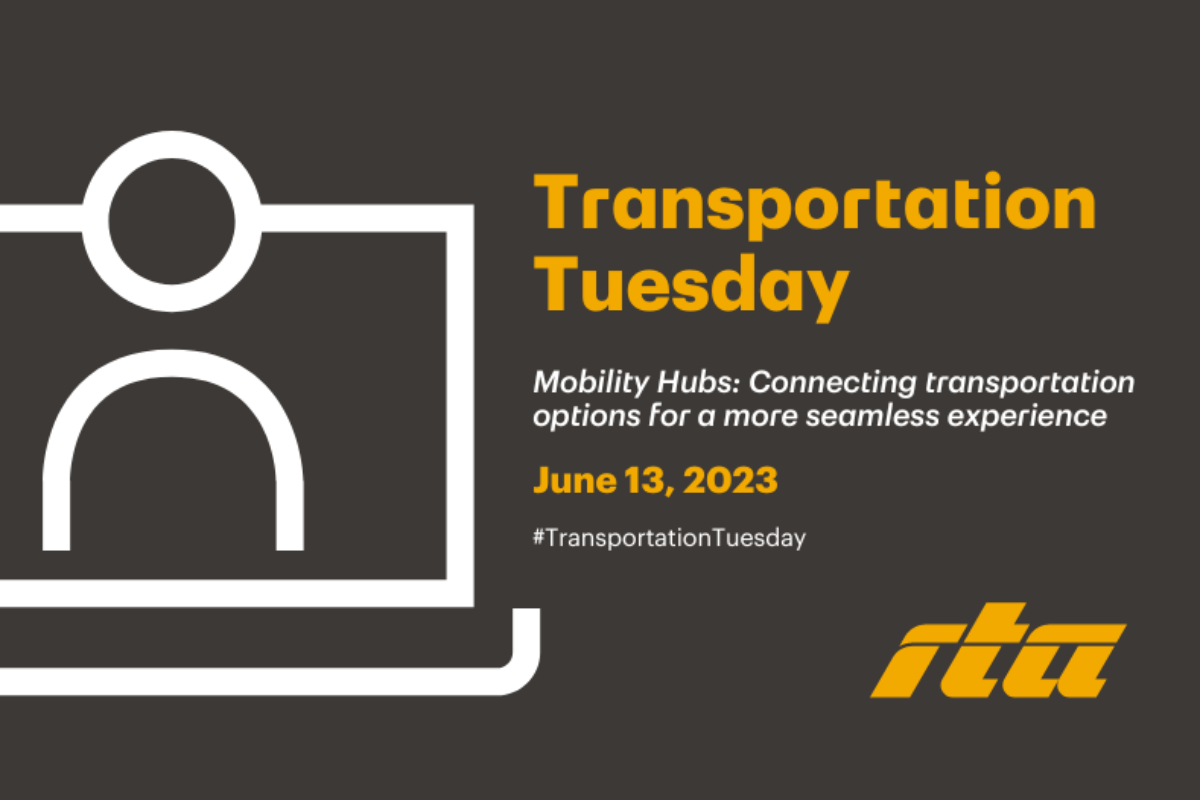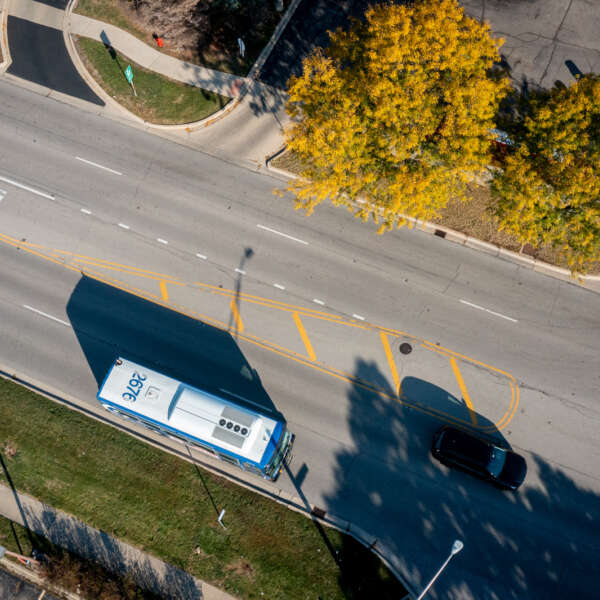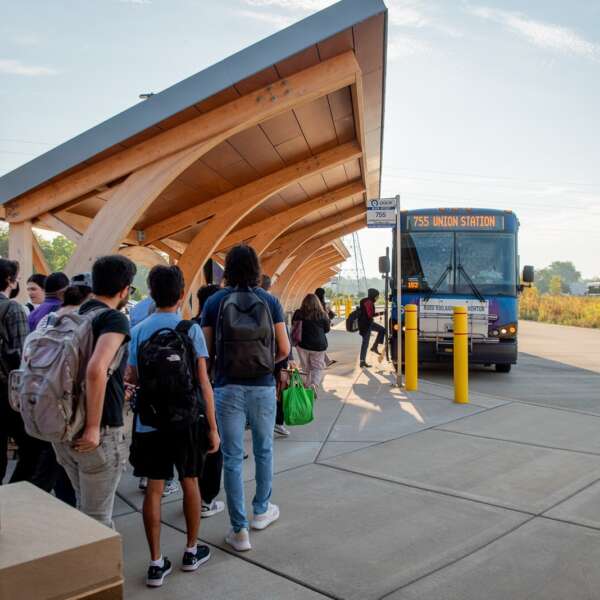Transportation Tuesday recap: Mobility Hubs: Connecting Transportation Options for a More Seamless Experience
June 14, 2023
June 14, 2023

“Mobility hub” is a term you may not have heard before, but you have likely interacted with one. Mobility hubs are places of connectivity where different travel options – walking, biking, transit, and shared mobility (such as shared bike or scooter stations) – come together. They provide an integrated suite of mobility services, amenities, and supporting technologies to better connect high-frequency transit to an individual's origin or destination and facilitate first and last mile solutions.
The second webinar in this year’s Transportation Tuesday series allowed attendees to learn the basics of planning, building, and implementing mobility hubs in the Chicago region and hear an example of successful mobility hub implementation in Minneapolis.
Panelists representing Twin Cities’ public transportation network Metro Transit, the Shared-Use Mobility Center, and Chicago’s racial equity movement nonprofit Equiticity gave presentations before a Q&A session. Moderator Robert Morris, RTA Senior Analyst in the Local Planning and Program Management Division, reminded attendees to check out Transit is the Answer to learn how the RTA is taking initiative to incorporate mobility hubs in our own regional transit strategic plan.
Metro Transit’s Shared Mobility Program Manager Meredith Klekotka began by walking attendees through the development process of mobility hubs and shared Metro Transit’s and the Metropolitan Council’s Mobility Hub Planning Guide, which was created to outline project goals and offer guidance to both regional and local stakeholders as they plan, design, implement, and manage mobility hubs. Highlighting the Minneapolis Mobility Hub Pilot and Metro Transit’s Regional Mobility Hub Pilot as examples, Klekotka emphasized that during the implementation of mobility hubs, planners will need to ensure they are consistent across the region in offering seamless, multimodal connections and catering to the mobility needs of residents in the neighborhoods.
Olatunji Oboi Reed, President and CEO of Equiticity, introduced the Go Hub Community Mobility Center currently under development in the North Lawndale neighborhood on the West Side of Chicago. The RTA has awarded Equiticity a grant from our Community Planning Program for technical assistance in developing an additional Go Hub in the Bronzeville neighborhood on Chicago’s South Side. The Go Hub is a project that targets racial equity and mobility justice to serve as a national model for initiatives in low-to moderate-income communities. Reed shared that the hub will be community-owned and will bring together integrated elements of mobility devices, infrastructure, and community rituals. The implementation process is heavily centered around considering the community’s needs to create connectivity to jobs, economic development, education, mental health services, and more.
Shared-Use Mobility Center CEO Benjie de la Peña explained that mobility hubs address spatial orientation, availability of options, and access to services. He stated that 1 in 4 adults in the United States experience “transportation insecurity” and cannot find an alternative mode of mobility if their primary mode of transportation is out of commission. Mobility hubs are created to address this issue, and help people get around their region without dependence on private cars or internet applications. Peña emphasized that mobility hubs also secure more travel options for a wider demographic with differing travel patterns, such as women and caregivers, or people of color. “We are early in the game. We need to show how viable these mobility hubs are and how they can serve more people and widen the service shed of people getting around without their cars,” said Peña.
The panelists expressed that mobility hubs are best developed through a community-based model, but obtaining adequate funding and establishing responsibility for these types of projects can be most challenging.
“We need more community-owned models to bring mobility hubs to life and address our communities' specific needs,” said Reed.
“Mobility hubs go beyond strictly utilitarian; they are about building public spaces... and balancing who needs to maintain it,” said Klekotka.
Transportation Tuesday takes place every Tuesday in June. The webinars are free, but registration is required. Learn more about future events and register to attend here.
Subscribe to our Newsletter
Related Articles
 Coalition members provide feedback on ‘Transforming Transit,’ RTA’s vision for improved service and accountability
Coalition members provide feedback on ‘Transforming Transit,’ RTA’s vision for improved service and accountability
Nearly 200 riders, advocates, and other stakeholders met virtually with the RTA on February 11 for the sixth quarterly Transit is the Answer Coalition meetin...
February 20, 2025 Far South Halsted Corridor Study prepares for future Pace Pulse service
Far South Halsted Corridor Study prepares for future Pace Pulse service
An RTA Community Planning project kicked off in late 2023 as a crucial step in bringing Pace Pulse service to Chicago’s south suburbs. The Far South Halsted ...
February 19, 2025 RTA proposes reforms to prioritize capital projects, maximizing impact of funding
RTA proposes reforms to prioritize capital projects, maximizing impact of funding
RTA is proposing a historic restructuring of the region’s transit governance to maximize the impact of new operating funding and ensure all riders experience...
February 5, 2025 RTA proposes reforms to integrate fares, require accountability for faster and more reliable transit
RTA proposes reforms to integrate fares, require accountability for faster and more reliable transit
RTA is proposing a historic restructuring of the region’s transit governance to maximize the impact of any new operating funding and ensure all riders experi...
February 5, 2025 For the third year in a row, regional transit ridership was up by double-digits in 2024
For the third year in a row, regional transit ridership was up by double-digits in 2024
Ridership across the Chicago region’s transit system continued to increase throughout 2024, according to the latest data from CTA, Metra, and Pace. The regio...
January 28, 2025 RTA is seeking $1.5 billion in annual operating funding. What would that mean for your commute?
RTA is seeking $1.5 billion in annual operating funding. What would that mean for your commute?
On January 15, RTA released Transforming Transit, a vision for the regional transit system with $1.5 billion in annual operating funding supported by a stron...
January 28, 2025